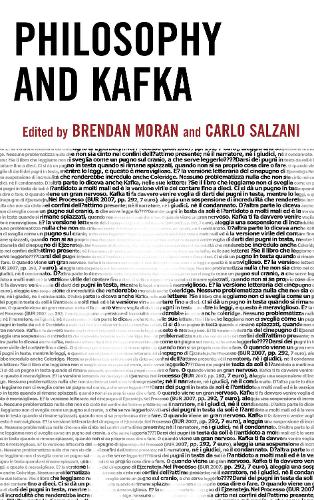
Philosophy and Kafka
(Paperback)
Publishing Details
Philosophy and Kafka
By (Author) Brendan Moran
Edited by Carlo Salzani
Contributions by Paul Alberts
Contributions by Ronald Bogue
Contributions by Chris Danta
Contributions by Paul Haacke
Contributions by Rainer Nagele
Contributions by Brian O'Connor
Contributions by Andrew R. Russ
Contributions by Peter Schwenger
Bloomsbury Publishing PLC
Lexington Books
25th February 2015
United States
Classifications
Tertiary Education
Non Fiction
Medieval Western philosophy
Literary studies: c 1900 to c 2000
142.78
Physical Properties
Paperback
300
Width 153mm, Height 230mm, Spine 22mm
454g
Description
The relationship of philosophy with Kafkas oeuvre is complex. It has been argued that Kafkas novels and stories defy philosophic extrapolation; conversely, it has also been suggested that precisely the tendency of Kafkas writings to elude discursive solution is itself a philosophical tendency, one that is somehow contributing to a wiser relationship of human beings with language. These matters are the focus of the proposed volume on Philosophy and Kafka. The proposed collection brings together essays that interrogate the relationship of philosophy and Kafka, and offer new and original interpretations. The volume obviously cannot claim completeness, but it partially does justice to the multiplicity of philosophical issues and philosophical interpretations at stake. This variety informs the composition of the volume itself. A number of essays focus on specific philosophical commentaries on Kafkas work, from Adornos to Agambens, from Arendts to Benjamins, from Deleuze and Guattaris to Derridas. A number of essays consider the possible relevance of certain philosophical outlooks for examining Kafkas writings: here Kafkas name goes alongside those of Socrates, Kant, Kierkegaard, Nietzsche, Wittgenstein, Buber, Heidegger, Blanchot, and Levinas. Finally, a number of essays consider Kafkas writings in terms of a specific philosophical theme, such as communication and subjectivity, language and meaning, knowledge and truth, the human/animal divide, justice, and freedom. In all contributions to the volume, such themes, motifs, and interpretations arise. To varying degrees, all essays are concerned with the relationship of literature and philosophy, and thus with the philosophical significance of Kafkas writings.
Reviews
Several readings are illuminating. ... Philosophy and Kafka contains many valuable insights. ... The illuminating moments of Philosophy and Kafka will reward curious fans of Kafka's work. * Jewish Review of Books *
These illuminating essays explore some of the ways in which the ideas of philosophers such as Socrates, Spinoza, Kierkegaard, and Kant are at play in Kafka's writing, and the ways in which more recent philosophers such as Adorno, Agamben, Arendt, and Benjamin have considered Kafka's work. What is more, many of the essays collected here shed light on the ways in which Kafka's own thinking can contribute to on-going philosophical debates about issues such as the conditions for identity, the nature of animality, the requirements of justice, and the moral implications and promise of certain forms of writing. Philosophy and Kafka is an important and long overdue contribution to Kafka scholarship as well as to philosophical reflection on a range of pressing issues. -- Marc Lucht
This essay collection the first of its kind explores a rich variety of ways in which Kafkas writings are bound to philosophical concerns. It bridges the gap between the philosophical and the literary, highlighting how the two coexist and illuminate one another. From Socrates to Agamben, from Kierkegaard to Wittgenstein, ethics and aesthetics, logic and literature, Kafkas prose resonates, reflects and provokes. By bringing together scholars from different disciplines, "Philosophy and Kafka" establishes fascinating new paths of enquiry into Kafkas thinking and philosophers engagement with it. It allows us to understand why we continue to be captured by Kafkas writing, standing as a testament to its relevance, and attesting to the vitality of the research it inspires. -- Uta Degner, University of Salzburg
Author Bio
Brendan Moran is currently research scholar at the Calgary Institute for the Humanities, and Adjunct associate professor at the University of Calgary, Canada, where he has taught in the Department of Philosophy, the Faculty of Humanities, and the Faculty of Arts. Under the anagrammatic pseudonym, Monad Rrenban, he has published Wild, Unforgettable Philosophy, a book on Walter Benjamins early writings. He has also published essays on Benjamin, Agamben, and Salomo Friedlaender, and is completing a book on Benjamins Kafkan politics. Carlo Salzani holds a degree in Philosophy from the University of Verona (Italy) and a PhD in Comparative Literature from Monash University (Australia). He has published Crisi e possibilit: Robert Musil e il tramonto dellOccidente (Bern: Peter Lang, 2010), Constellations of Readings: Walter Benjamin in Figures of Actuality (Oxford: Peter Lang, 2009) and co-edited Essays on Boredom and Modernity (Amsterdam: Rodopi, 2009). He has translated into Italian some of Slavoj ieks books.
